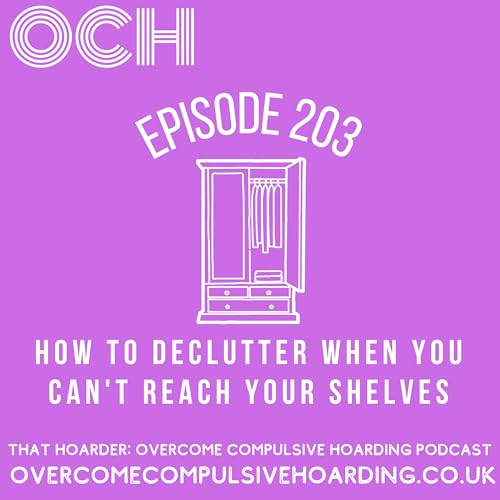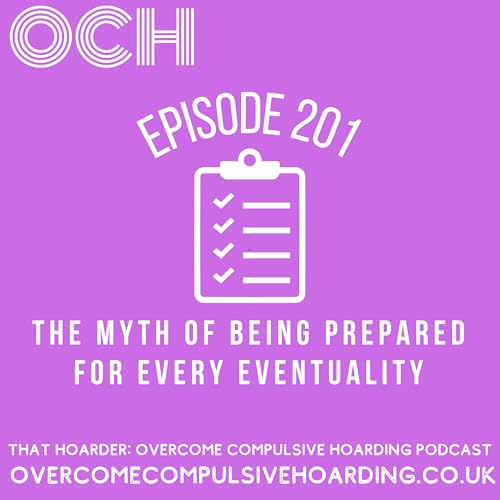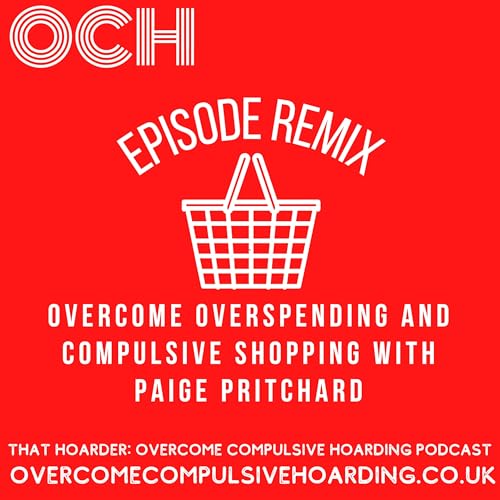Come to a Dehoarding Accountability Zoom Session: http://www.overcomecompulsivehoarding.co.uk/ticketSubscribe to the podcast: https://www.overcomecompulsivehoarding.co.uk/subscribePodcast show notes, links and transcript: http://www.overcomecompulsivehoarding.co.uk/ On this episode, I’m joined by Dr Jan Eppingstall to unpack how our possessions connect with our sense of identity and self-concept, and why letting go can feel so threatening for those of us who hoard. We talk through how objects hold meaning, memories, and dreams for the future, and what it looks like to build a stronger sense of self without clinging to things. If you’ve ever felt like discarding something meant losing a part of yourself, you definitely want to listen to this one. We break down exactly why that fear happens and where to start. A plant pot associated with negative experiences.Discussion of emotional and aesthetic reasons for keeping vs. discarding.Objects “glowering" at us.Identity and Self-Concept in HoardingDefinition of identity and self-concept.Possessions and Sense of IdentityThe psychological process of possessions intertwining with identity.How this differs from typical sentimental attachment.Retention itself (rather than use or display) as a meaning-making act in hoarding.The difference between identity (roles, characteristics, life story) and self-concept (beliefs about self, worth, and abilities).Typical patterns seen in people with hoarding disorder: fragmented identity, externalised identity via objects.Psychological Fusion Between Identity and PossessionsThe concept of "identity objects" — how discarding items feels like losing part of oneself.Objects as external proof and storage for identity, memory, and meaning.Safety of objects over human relationships.The cycle of validation and shame in hoarding.Pathways to Possession-Identity FusionChildhood experiences and boundary violations leading to control needs.Identity confusion and external markers for self-definition.Psychological ownership: objects as self-extension.Functions of retained objects—proof of past, present, and future self.Anthropomorphism and obligations to objects.Executive function challenges: objects as external memory aids.Perfectionism and fantasy identity protection.Influence of cultural materialism and marketing.The Fear of Losing Identity When Discarding Objects"Throwing away part of myself."Three psychological routes for ownership: control, intimate knowledge, and personal investment.The role of control and avoidance of uncertainty.The painful admission of poor judgment (e.g., unworn clothing) when discarding.Possessions as Identity MarkersRetaining items from past roles (retired teachers, old job materials).Holding onto objects representing hopes for future identity.Objects as evidence for important life chapters, relationships, or personal history.Psychological needs these objects serve and when that becomes problematic.Books as Proof of Intellectual IdentityDiscussion of books held as evidence of being intellectual, regardless of actual reading.Exploration of how objects can become substitutes for action and risk.Therapeutic approach to shifting identity building from possession to action.Community and Connection in the Hoarding JourneyThe loneliness and isolation frequently felt by people who hoard.The importance of community, connection, and peer support, including podcast listeners and accountability sessions.Effects of increased openness and connection on identity.Identity Shifts During Dehoarding and RecoveryChanges in identity during the process of recovery and letting go.Building new narratives — sometimes research or recovery itself becomes an identity.Increased connection and belonging through shared experience and vulnerability.Maintaining Identity Without Excessive PossessionStrategies for building identity through actions, creativity, and lived experience.Selecting representative or truly meaningful items rather than keeping everything.Observing how "non-hoarding" individuals make decisions about sentimental items.Discomfort and growth opportunities in sharing one's journey while still in progress.The value of authenticity and vulnerability.First Steps for Listeners Fearing Loss of Self Through DiscardingAcknowledging that fear is rational and understandable.Suggesting mindful observation of attachment thoughts.Testing beliefs by gentle action, e.g., creative tasks with what is already available.Finding supportive people for accountability and encouragement.Reflective work on personal values — building identity from the inside.Reassurance that identity predates possessions and is not dependent on them.Objects as scaffolding rather than the core of one’s identity.Encouragement to trust oneself and to start building stability from within. Links Come to a Dehoarding Accountability Zoom session: Accountability Booking FormDr Jan Eppingstall at Stuffologyhttps://www.facebook.com/stuffologyconsulting/https://...
Más
Menos
 1 h y 4 m
1 h y 4 m 39 m
39 m 1 h y 21 m
1 h y 21 m 27 m
27 m Nov 1 202544 m
Nov 1 202544 m 44 m
44 m Oct 17 202533 m
Oct 17 202533 m 1 h y 16 m
1 h y 16 m
